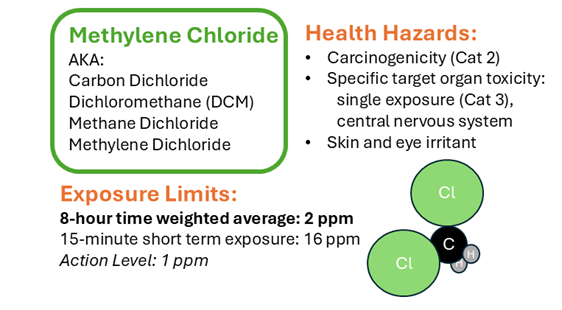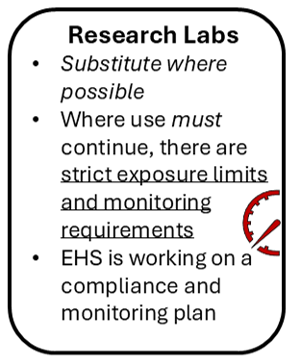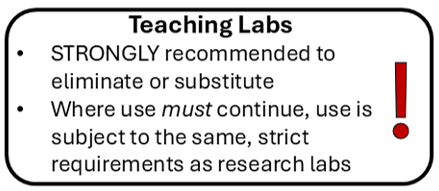In early 2024, the EPA ruled to prohibit most uses of Methylene Chloride under the Toxic Substances Control Act (TSCA).
Methylene Chloride is a hazardous chemical used as a laboratory solvent in addition to various commercial applications. This chemical has been recently recognized to present an "unreasonable risk of injury to health" by the EPA, resulting in strict regulations under TSCA which includes significantly lowered exposure limits that affect both employed workers and members of the general public.

Methylene Chloride is in use on grounds as a laboratory chemical. However, it is also a component of many common products, such as adhesive removers. After consumer protections are fully enacted in May 2025, only specifically allowed situations, such as a chemical in a laboratory setting, will be able to use Methylene Chloride. To comply with the TSCA ruling, such permitted use will need to be monitored by Environmental Health & Safety to ensure that no one is exceeding the reduced exposure limits. After May 2025, commercial products containing Methylene Chloride will not be available for purchase; however, it is important to determine if any currently owned products contain Methylene Chloride.
Federal Register - Methylene Chloride Final Rule
EPA - Methylene Chloride Factsheet
EPA - Methylene Chloride Compliance Guide
The first steps towards ensuring the safety of everyone on grounds, and towards complying with the new regulation, is to identify whether Methylene Chloride is being used in your spaces.


Chromatography: A convenient guide to help select replacement solvents for dichloromethane in chromatography - Green Chemistry (RSC Publishing)
Organic and Medicinal Chemistry: Chlorinated Solvents: Their Advantages, Disadvantages, and Alternatives in Organic and Medicinal Chemistry | Chemical Reviews (acs.org)
Greener Solvents: From sigmaaldrich.com
Green Chemistry Tools: Green chemistry tools to influence a medicinal chemistry and research chemistry based organisation - Green Chemistry (RSC Publishing)
Contact EHS at 434.982.4911 for any questions or guidance.